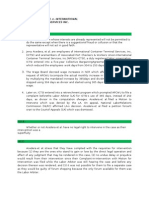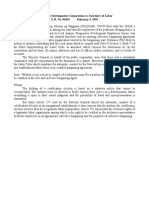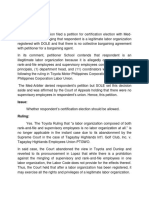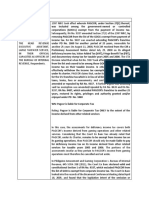Villar v. Inciong
Villar v. Inciong
Uploaded by
Kathlene JaoCopyright:
Available Formats
Villar v. Inciong
Villar v. Inciong
Uploaded by
Kathlene JaoCopyright
Available Formats
Share this document
Did you find this document useful?
Is this content inappropriate?
Copyright:
Available Formats
Villar v. Inciong
Villar v. Inciong
Uploaded by
Kathlene JaoCopyright:
Available Formats
G.R. No.
L-50283-84 April 20, 1983
DOLORES VILLAR, ROMEO PEQUITO, DIONISIO RAMOS, BENIGNO MAMARALDO, ORLANDO
ACOSTA, RECITACION BERNUS, ANSELMA ANDAN, ROLANDO DE GUZMAN and RITA
LLAGAS, petitioners,
vs.
THE HON. AMADO G. INCIONG, as Deputy Minister of the Ministry of Labor, AMIGO
MANUFACTURING INCORPORATED and PHILIPPINE ASSOCIATION OF FREE LABOR UNIONS
(PAFLU), respondents.
FACTS:
Petitioners were members of the Amigo Employees Union-PAFLU, a duly registered labor organization
which, at the time of the present dispute, was the existing bargaining agent of the employees in private
respondent Amigo Manufacturing, Inc.
The Company and the Amigo Employees Union-PAFLU had a collective bargaining agreement governing
their labor relations, which agreement was then about to expire on February 28, 1977. Within the last sixty
(60) days of the CBA, events transpired giving rise to the present dispute.
Upon written authority of at least 30% of the employees in the company, including the petitioners, the
Federation of Unions of Rizal filed a petition for certification election with the Ministry of Labor and
Employment. The petition was, however, opposed by the Philippine Association of Free Labor Unions with
whom, as stated earlier, the Amigo Employees Union was at that time affiliated.
PAFLU's opposition cited the "Code of Ethics" governing inter-federation disputes among and between
members of the Trade Unions Congress of the Philippines. Consequently, the Med-Arbiter indorsed the
case to TUCP for appropriate action but before any such action could be taken thereon, the petitioners
deauthorized FUR from continuing the petition for certification election for which reason FUR withdrew
the petition.
Petitioner Dolores Villar, representing herself to be the authorized representative of the Amigo Employees
Union, filed a petition for certification election in the Company.
The Amigo Employees Union-PAFLU intervened and moved for the dismissal of the petition for
certification election filed by Dolores Villar, citing as grounds therefore:
(1) The petition lacked the mandatory requisite of at least 30% of the employees in the bargaining
unit;
(2) Dolores Villar had no legal personality to sign the petition since she was not an officer of the
union nor is there factual or legal basis for her claim that she was the authorized representative of
the local union;
(3) there was a pending case for the same subject matter filed by the same individuals;
(4) The petition was barred by the new CBA concluded on February 15, 1977;
(5) There was no valid disaffiliation from PAFLU; and
(6) The supporting signatures were procured through false pretenses.
In these two cases filed before the Regional Office No. 4, the parties adopted their previous positions when
they were still arguing before the PAFLU trial committee.
Regional Office No. 4, rendered a decision jointly resolving said two cases, that the application of Amigo
Manufacturing Inc., is GRANTED. While, the preliminary injunction to restrain Amigo Manufacturing for
their termination was DISMISSED.
Hence, this instant petition to the Supreme Court.
ISSUE:
Whether or not neither the disaffiliation of the Amigo Employees Union from PAFLU nor the act of filing the
petition for certification election constitute disloyalty as these are in the exercise of their constitutional right to self-
organization.
RULING:
It is true that disaffiliation from a labor union is not open to legal objection. It is implicit in the freedom of
association ordained by the Constitution. But this Court has laid down the ruling that a closed shop is a valid form
of union security, and such provision in a collective bargaining agreement is not a restriction of the right of freedom
of association guaranteed by the Constitution.
In the present case, the Company and the Amigo Employees Union- PAFLU entered into a CBA with a union
security clause which is a reiteration of the old CBA. The quoted stipulation for closed-shop is clear and
unequivocal. Petitioners’ theory that their expulsion was not valid upon the grounds is untenable. PAFLU had the
authority to investigate petitioners on the charges filed by their co-employees in the local union and after finding
them guilty as charged, to expel them from the roll of membership of the Amigo Employees Union-PAFLU is clear
under the constitution of the PAFLU to which the local union was affiliated. And pursuant to the security clause of
the new CBA, reiterating the same clause in the old CBA, PAFLU was justified in applying said security clause.
Recognized and salutary is the principle that when a labor union affiliates with a mother union, it becomes bound
by the laws and regulations of the parent organization. It is undisputable that oppositors were members of the Amigo
Employees Union at the time that said union affiliated with PAFLU; hence, oppositors are bound by the laws and
regulations of PAFLU. Inherent in every labor union, or any organization for that matter, is the right of self-
preservation. When members of a labor union seek the disintegration and destruction of the very union to which they
belong; they thereby forfeit their rights to remain as members of the union which they seek to destroy. Prudence and
equity, as well as the dictates of law and justice, therefore, compelling mandate the adoption by the labor union of
such corrective and remedial measures, in keeping with its laws and regulations, for its preservation and continued
existence; lest by its folly and inaction, the labor union crumble and fall.
You might also like
- Statutory Construction NotesDocument32 pagesStatutory Construction Notespriam gabriel d salidaga95% (112)
- Unit 4.judicial Process As An Instrument of Social ChangeDocument7 pagesUnit 4.judicial Process As An Instrument of Social Changeamit rathee100% (7)
- Lawyers and Attorneys Are Not Licensed To Practice LawDocument5 pagesLawyers and Attorneys Are Not Licensed To Practice LawreigningscorpiosNo ratings yet
- Villar Vs InciongDocument2 pagesVillar Vs InciongRZ Zamora100% (2)
- Case Digest For NegoDocument2 pagesCase Digest For NegokarenkierNo ratings yet
- Importance of Law and Legal Awareness For TeachersDocument10 pagesImportance of Law and Legal Awareness For TeachersIsmail nilamNo ratings yet
- KL University RespondentDocument21 pagesKL University Respondentraghuath100% (3)
- VILLAR v. INCIONGDocument1 pageVILLAR v. INCIONGKathlene JaoNo ratings yet
- Villar vs. InciongDocument2 pagesVillar vs. InciongAnny YanongNo ratings yet
- Labor Relations - 85-109Document57 pagesLabor Relations - 85-109Isabelle CaspilloNo ratings yet
- VILLAR vs. INCIONGDocument2 pagesVILLAR vs. INCIONGBandar TingaoNo ratings yet
- Villar: Guerrero, J.Document2 pagesVillar: Guerrero, J.One TwoNo ratings yet
- Villar Vs InciongDocument4 pagesVillar Vs InciongAllen Windel BernabeNo ratings yet
- Villar vs. InciongDocument3 pagesVillar vs. InciongFrancis PunoNo ratings yet
- 30 Dolores Villar Et Al Vs InciongDocument3 pages30 Dolores Villar Et Al Vs Inciongkarl doceoNo ratings yet
- LabRel Digest 2Document4 pagesLabRel Digest 2Akachan Perspicacious-DayoNo ratings yet
- Labor Relation Digest Case Allan Velasco Group 3Document30 pagesLabor Relation Digest Case Allan Velasco Group 3Cee Jay100% (1)
- Part III-2Document91 pagesPart III-2thornapple25No ratings yet
- Dolores Villar Vs Hon. InciongDocument7 pagesDolores Villar Vs Hon. InciongbrendamanganaanNo ratings yet
- 045 - Villar vs. InciongDocument4 pages045 - Villar vs. InciongPatrick ManaloNo ratings yet
- 104-Villar v. Inciong G.R. Nos. L-50283-84 April 20, 1983Document10 pages104-Villar v. Inciong G.R. Nos. L-50283-84 April 20, 1983Jopan SJNo ratings yet
- 194 Villar V Inciong (Case Digest)Document2 pages194 Villar V Inciong (Case Digest)Kornessa ParasNo ratings yet
- Villar v. InciongDocument3 pagesVillar v. Inciongjpc4a7102No ratings yet
- Villar Vs InciongDocument2 pagesVillar Vs InciongManok PhilmusicNo ratings yet
- Aniceto Haber For Petitioners. Roberto T. Neri For RespondentsDocument72 pagesAniceto Haber For Petitioners. Roberto T. Neri For RespondentsMICAELA NIALANo ratings yet
- Villar v. InciongDocument16 pagesVillar v. InciongSamuel ValladoresNo ratings yet
- G.R. No. L-50283-84Document6 pagesG.R. No. L-50283-84Aqua YutchNo ratings yet
- Philippine Skylanders, Inc. v. NLRCDocument8 pagesPhilippine Skylanders, Inc. v. NLRCClarence ProtacioNo ratings yet
- Villar Vs InciongDocument3 pagesVillar Vs Inciongkris torresNo ratings yet
- Villar Vs InchiongDocument20 pagesVillar Vs InchiongAllyssa Jane RualloNo ratings yet
- Gamboa, Joelyn Marie G. (Week 2)Document4 pagesGamboa, Joelyn Marie G. (Week 2)Agnes GamboaNo ratings yet
- Labor Feb 14 NotesDocument42 pagesLabor Feb 14 NotesZy AquilizanNo ratings yet
- Labor Relations Cases, Philippine JurisprudenceDocument4 pagesLabor Relations Cases, Philippine JurisprudenceSummerBridgeNo ratings yet
- 14 Villar, Et. Al vs. Inciong G.R. No. L-50283-84Document1 page14 Villar, Et. Al vs. Inciong G.R. No. L-50283-84Monica FerilNo ratings yet
- BF Goodrich Confidential and Salaried Employees Union v. BF Goodrich, Phils. Inc., 49 SCRA 532Document14 pagesBF Goodrich Confidential and Salaried Employees Union v. BF Goodrich, Phils. Inc., 49 SCRA 532FD BalitaNo ratings yet
- 1978 Consolidated Farm Vs NorielDocument10 pages1978 Consolidated Farm Vs NorielJoan Dela CruzNo ratings yet
- Case Digests 17Document7 pagesCase Digests 17Macy TangNo ratings yet
- Set 3 Labor DigestDocument12 pagesSet 3 Labor DigestDK KaliNo ratings yet
- 172 Samahan NG Mga Manggagawa Sa Filsystems Vs Secretary of LaborDocument2 pages172 Samahan NG Mga Manggagawa Sa Filsystems Vs Secretary of LaborJet SiangNo ratings yet
- Labor DigestsDocument6 pagesLabor DigestskarenkierNo ratings yet
- Bitlex Phils. Labor Union (NAFLU) v. Filflex Industrial and Manufacturing Corp DigestDocument1 pageBitlex Phils. Labor Union (NAFLU) v. Filflex Industrial and Manufacturing Corp DigestReyn ArcenalNo ratings yet
- Philippine Association of Service Exporters Inc. vs. Drilon GR. No. 81958 June 30, 1988 FactsDocument12 pagesPhilippine Association of Service Exporters Inc. vs. Drilon GR. No. 81958 June 30, 1988 FactsElsie Brutas TexonNo ratings yet
- Case Digests LaborLaw2020Document105 pagesCase Digests LaborLaw2020Aiza SaraNo ratings yet
- 008-Bautista v. InciongDocument4 pages008-Bautista v. InciongwewNo ratings yet
- Case Digest Labor LawDocument8 pagesCase Digest Labor LawArthur SyNo ratings yet
- Philippine Skylanders v. NLRC, GR 127374, January 31, 2002Document1 pagePhilippine Skylanders v. NLRC, GR 127374, January 31, 2002genshin asiaNo ratings yet
- Paflu V Cfi of Rizal (GR L-49580)Document6 pagesPaflu V Cfi of Rizal (GR L-49580)Anonymous lf4sGjONo ratings yet
- Case Digests LaborLaw2020Document105 pagesCase Digests LaborLaw2020Aiza SaraNo ratings yet
- Case Digests 16Document5 pagesCase Digests 16Macy Tang0% (1)
- Usita Digests Labrel (Part 3Document9 pagesUsita Digests Labrel (Part 3Viceni AlbaNo ratings yet
- Philippine Labor Alliance Council v. Bureau of Labor RelationsDocument8 pagesPhilippine Labor Alliance Council v. Bureau of Labor Relations149890No ratings yet
- 61 Mariwasa Vs Sec o - DOLE-DigestDocument2 pages61 Mariwasa Vs Sec o - DOLE-DigestNylaNo ratings yet
- Labor 2Document23 pagesLabor 2Carlo Tristan CantaNo ratings yet
- 5 Cases On UnionsDocument6 pages5 Cases On UnionsCJ LlanesNo ratings yet
- Villar vs. InciongDocument23 pagesVillar vs. InciongPatrisha AlmasaNo ratings yet
- Labor Law 2Document9 pagesLabor Law 2ryan virgoNo ratings yet
- Labor Law DigestDocument16 pagesLabor Law DigestCkk Fionna GluttonsxtrixieNo ratings yet
- 102 - Filipino Pipe and Foundry Corp. v. NLRC, 318 SCRA 68 (1999)Document10 pages102 - Filipino Pipe and Foundry Corp. v. NLRC, 318 SCRA 68 (1999)John Paul EslerNo ratings yet
- VASSAR INDUSTRIES EMPLOYEES UNION VIEU vs. ESTRELLADocument1 pageVASSAR INDUSTRIES EMPLOYEES UNION VIEU vs. ESTRELLABandar TingaoNo ratings yet
- Sanyo Philippines Workers Union-PSSLU Vs Canizares: FactsDocument7 pagesSanyo Philippines Workers Union-PSSLU Vs Canizares: FactsDon VillegasNo ratings yet
- Assignment 6 LaborDocument48 pagesAssignment 6 LaborNickyy IlaganNo ratings yet
- Labor 2Document25 pagesLabor 2Anonymous aDY1FFGNo ratings yet
- 099-Vassar Industries Employees Union v. Estrella G.R. No. L-46562 March 31, 1978Document4 pages099-Vassar Industries Employees Union v. Estrella G.R. No. L-46562 March 31, 1978Jopan SJNo ratings yet
- Consumer Protection in India: A brief Guide on the Subject along with the Specimen form of a ComplaintFrom EverandConsumer Protection in India: A brief Guide on the Subject along with the Specimen form of a ComplaintNo ratings yet
- Pre Test Introduction To PhilosophyDocument5 pagesPre Test Introduction To PhilosophyKathlene JaoNo ratings yet
- Organization and ManagementDocument5 pagesOrganization and ManagementKathlene JaoNo ratings yet
- Criminal-Law-3 Final-Exam Jan 18 2023Document4 pagesCriminal-Law-3 Final-Exam Jan 18 2023Kathlene JaoNo ratings yet
- January TNCTDocument2 pagesJanuary TNCTKathlene JaoNo ratings yet
- Pointers CL3 FinalsDocument6 pagesPointers CL3 FinalsKathlene JaoNo ratings yet
- JV PPT KatDocument2 pagesJV PPT KatKathlene JaoNo ratings yet
- Business Ethics and Social Responsibility ActivityDocument3 pagesBusiness Ethics and Social Responsibility ActivityKathlene JaoNo ratings yet
- Significance of Cultural Social Political and Economic Symbols and PracticesDocument27 pagesSignificance of Cultural Social Political and Economic Symbols and PracticesKathlene JaoNo ratings yet
- Joint VenturesDocument3 pagesJoint VenturesKathlene JaoNo ratings yet
- Proposed Business Case AnalysisDocument13 pagesProposed Business Case AnalysisKathlene JaoNo ratings yet
- Proposed Business Case Analysis 1Document19 pagesProposed Business Case Analysis 1Kathlene JaoNo ratings yet
- Digests 1Document21 pagesDigests 1Kathlene JaoNo ratings yet
- Digests-1 2Document7 pagesDigests-1 2Kathlene JaoNo ratings yet
- Verceles vs. Bureau of Labor RelationsDocument2 pagesVerceles vs. Bureau of Labor RelationsKathlene JaoNo ratings yet
- Q1 Week 5 Lesson 4 Significance of Cultural Social Political and Economic Symbols and PracticesDocument27 pagesQ1 Week 5 Lesson 4 Significance of Cultural Social Political and Economic Symbols and PracticesKathlene JaoNo ratings yet
- TaxDocument4 pagesTaxKathlene JaoNo ratings yet
- TableDocument2 pagesTableKathlene JaoNo ratings yet
- GR 75037 Tanduay V NLRCDocument2 pagesGR 75037 Tanduay V NLRCKathlene JaoNo ratings yet
- Volkschel Labor Union Vs BLRDocument2 pagesVolkschel Labor Union Vs BLRKathlene JaoNo ratings yet
- Merritt VDocument15 pagesMerritt VKathlene JaoNo ratings yet
- CIRTEK EMPLOYEES LABOR UNION vs. CIRTEK ELECTRONICS, INC.Document3 pagesCIRTEK EMPLOYEES LABOR UNION vs. CIRTEK ELECTRONICS, INC.Kathlene JaoNo ratings yet
- Tanduay Distillery vs. NLRCDocument2 pagesTanduay Distillery vs. NLRCKathlene JaoNo ratings yet
- Imbong v. Ochoa DigestDocument6 pagesImbong v. Ochoa DigestacNo ratings yet
- Right To Education Act 2009Document10 pagesRight To Education Act 2009Pale LuckyNo ratings yet
- Customary Law NotesDocument39 pagesCustomary Law NotesRuvimbo MakwindiNo ratings yet
- G.R. No. 87636 NEPTALI A. GONZALES v. CATALINO MACARAIGDocument31 pagesG.R. No. 87636 NEPTALI A. GONZALES v. CATALINO MACARAIGMarkNo ratings yet
- Evelyn Greaves Bey Final Name Correction Proclamation and DeclarationDocument3 pagesEvelyn Greaves Bey Final Name Correction Proclamation and Declarationchevz brown beyNo ratings yet
- Kendrick Wilson Lawsuit Against Brett HankisonDocument20 pagesKendrick Wilson Lawsuit Against Brett HankisonNational Content DeskNo ratings yet
- Bangladesh Biman Corporation & Others vs. Md. Yousuf Haroon & Others, 2002, 31 CLCDocument8 pagesBangladesh Biman Corporation & Others vs. Md. Yousuf Haroon & Others, 2002, 31 CLCRomana AfrozeNo ratings yet
- Right To Property Under Indian ConstitutionDocument4 pagesRight To Property Under Indian ConstitutionvarshaNo ratings yet
- Resident Marine Mammals of Protected Seascape Tanon Strait, Et Al. v. Secretary Angelo ReyesDocument19 pagesResident Marine Mammals of Protected Seascape Tanon Strait, Et Al. v. Secretary Angelo ReyesDenise CruzNo ratings yet
- Jed Salvio Paracha Case Digest-Local Government - Political LawDocument13 pagesJed Salvio Paracha Case Digest-Local Government - Political LawJed Takoy ParachaNo ratings yet
- Speech in The ConventionDocument2 pagesSpeech in The Conventionhamdidorgham126No ratings yet
- 2003 - US History Documents Prentice Hall Inc.Document687 pages2003 - US History Documents Prentice Hall Inc.DongelxNo ratings yet
- SLPDocument116 pagesSLPAnkit KumarNo ratings yet
- Common and Civil Law NotesDocument38 pagesCommon and Civil Law NotesNumfor JudeNo ratings yet
- Articles 32 & 226 - Supreme Court Judgments On Scope of Writ Jurisdiction (2021)Document11 pagesArticles 32 & 226 - Supreme Court Judgments On Scope of Writ Jurisdiction (2021)Aditya GoyalNo ratings yet
- Case AnalysisDocument4 pagesCase AnalysisDarling Pavan KingNo ratings yet
- Silahis International HotelDocument17 pagesSilahis International HotelRajkumariNo ratings yet
- Domino v. ComelecDocument4 pagesDomino v. ComelecRaymond RoqueNo ratings yet
- Internship ReportDocument25 pagesInternship Reportalbert100% (1)
- Administative Law NotesDocument168 pagesAdministative Law NotesZESCONo ratings yet
- Na Order ProcedureDocument5 pagesNa Order ProcedureChaitanya IdateNo ratings yet
- Constitutionally Conferred Upon The Department Claiming Its Exercise-Since The Conferment Is Usually DoneDocument35 pagesConstitutionally Conferred Upon The Department Claiming Its Exercise-Since The Conferment Is Usually DoneDora the ExplorerNo ratings yet
- Estrada vs. Ombudsman, Sandiganbayan Et - Al.Document26 pagesEstrada vs. Ombudsman, Sandiganbayan Et - Al.Stef OcsalevNo ratings yet
- Federalism in The PhilippinesDocument42 pagesFederalism in The PhilippinesAlyza Supnad ElefanteNo ratings yet
- Justice Peralta Case SyllabiDocument204 pagesJustice Peralta Case SyllabiAnge Buenaventura Salazar100% (1)















































































































